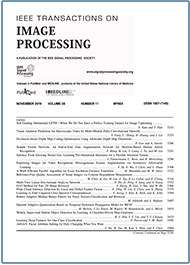- Our Story
- Publications & Resources
- Publications & Resources
- Publications
- IEEE Signal Processing Magazine
- IEEE Journal of Selected Topics in Signal Processing
- IEEE Signal Processing Letters
- IEEE Transactions on Computational Imaging
- IEEE Transactions on Image Processing
- IEEE Transactions on Information Forensics and Security
- IEEE Transactions on Multimedia
- IEEE Transactions on Signal and Information Processing over Networks
- IEEE Transactions on Signal Processing
- IEEE TCI
- IEEE TSIPN
- Data & Challenges
- Submit Manuscript
- Guidelines
- Information for Authors
- Special Issue Deadlines
- Overview Articles
- Top Accessed Articles
- SPS Newsletter
- SigPort
- SPS Resource Center
- Publications FAQ
- Blog
- News
- Dataset Papers
- Conferences & Events
- Community & Involvement
- Professional Development
- For Volunteers
- Information for Authors-OJSP
-
Home
Conferences Events IEEE Signal Processing Magazine IEEE SPL Article IEEE TIFS Article IEEE TMM Article IEEE TSP Article Jobs in Signal Processing Lectures Machine Learning Seasonal Schools Signal Processing News SPM Article SPS Distinguished Lectures SPS Newsletter Article SPS Webinar SPS Webinars SPS Webinar Series Webinar webinars
-
Our Story
What is Signal Processing?

The technology we use, and even rely on, in our everyday lives –computers, radios, video, cell phones – is enabled by signal processing. Learn More » -
Publications & Resources
-
SPS Resources
- Signal Processing Magazine The premier publication of the society.
- SPS Newsletter Monthly updates in Signal Processing
- SPS Resource Center Online library of tutorials, lectures, and presentations.
- SigPort Online repository for reports, papers, and more.
- SPS Feed The latest news, events, and more from the world of Signal Processing.
-
SPS Resources
-
Conferences & Events
-
Community & Involvement
-
Membership
- Join SPS The IEEE Signal Processing Magazine, Conference, Discounts, Awards, Collaborations, and more!
- Chapter Locator Find your local chapter and connect with fellow industry professionals, academics and students
- Women in Signal Processing Networking and engagement opportunities for women across signal processing disciplines
- Students Scholarships, conference discounts, travel grants, SP Cup, VIP Cup, 5-MICC
- Young Professionals Career development opportunities, networking
- Get Involved
-
Technical Committees
- Applied Signal Processing Systems
- Audio and Acoustic Signal Processing
- Bio Imaging and Signal Processing
- Computational Imaging
- Image Video and Multidimensional Signal Processing
- Information Forensics and Security
- Machine Learning for Signal Processing
- Multimedia Signal Processing
- Sensor Array and Multichannel
- Signal Processing for Communication and Networking
- Signal Processing Theory and Methods
- Speech and Language Processing
- Technical Working Groups
- More TC Resources
-
Membership
-
Professional Development
-
Professional Development
- Signal Processing Mentorship Academy (SigMA) Program
- Micro Mentoring Experience Program (MiME)
- Distinguished Lecturer Program
- Distinguished Lecturers
- Distinguished Lecturer Nominations
- Past Lecturers
- Distinguished Industry Speaker Program
- Distinguished Industry Speakers
- Distinguished Industry Speaker Nominations
- Industry Resources
- IEEE Training Materials
- Jobs in Signal Processing: IEEE Job Site
-
Career Resources
- SPS Education Program Educational content in signal processing and related fields.
- Distinguished Lecturer Program Chapters have access to educators and authors in the fields of Signal Processing
- Job Opportunities Signal Processing and Technical Committee specific job opportunities
- Job Submission Form Employers may submit opportunities in the area of Signal Processing.
-
Professional Development
-
For Volunteers
-
For Board & Committee Members
- Board Agenda/Minutes* Agendas, minutes and supporting documentation for Board and Committee Members
- SPS Directory* Directory of volunteers, society and division directory for Board and Committee Members.
- Membership Development Reports* Insight into the Society’s month-over-month and year-over-year growths and declines for Board and Committee Members
-
For Board & Committee Members
Popular Pages
Today's:
- Information for Authors
- IEEE Transactions on Information Forensics and Security
- (ICME 2026) 2026 IEEE International Conference on Multimedia and Expo
- IEEE Transactions on Multimedia
- Last Call for Nominations! SPS Chapter of the Year Award
- Submit Your Proposals for 2026 Member Driven Initiatives
- Signal Processing Cup
- Call for Project Proposals: IEEE SPS SigMA Program - Signal Processing Mentorship Academy
- IEEE Signal Processing Letters
- (ISBI 2026) 2026 IEEE 23rd International Symposium on Biomedical Imaging
- Information for Authors-SPL
- IEEE Transactions on Image Processing
- Submit a Manuscript
- IEEE Transactions on Signal Processing
- Unified EDICS
All time:
- Information for Authors
- Submit a Manuscript
- IEEE Transactions on Image Processing
- IEEE Transactions on Information Forensics and Security
- IEEE Transactions on Multimedia
- IEEE Transactions on Audio, Speech and Language Processing
- IEEE Signal Processing Letters
- IEEE Transactions on Signal Processing
- Conferences & Events
- IEEE Journal of Selected Topics in Signal Processing
- Information for Authors-SPL
- Conference Call for Papers
- Signal Processing 101
- IEEE Signal Processing Magazine
- Guidelines
Last viewed:
- IEEE Transactions on Information Forensics and Security
- Information for Authors
- Signal Processing Society Chapters' Best Practices: Chirag Paunwala
- (ICME 2025) 2025 IEEE International Conference on Multimedia and Expo
- (ICME 2026) 2026 IEEE International Conference on Multimedia and Expo
- Call for Proposals: IEEE ICME 2026
- (EUSIPCO 2025) 2025 European Signal Processing Conference
- IEEE Fellows Program
- IEEE SPS SAM TC Webinar: 20 April 2022, by Maria Sabrina Greco
- IEEE TMM Special Issue on Large Multi-modal Models for Dynamic Visual Scene Understanding
- Signal Processing Cup
- (AVSS 2025) 2025 IEEE International Conference on Advanced Video and Signal-Based Surveillance
- Join a Technical Committee
- About IEEE Transactions on Signal Processing
- IEEE Transactions on Signal Processing
Patch-Based Dual-Tree Complex Wavelet Transform for Kinship Recognition
You are here
Publications & Resources
Transactions on Image Processing
For Authors
Top Reasons to Join SPS Today!
1. IEEE Signal Processing Magazine
2. Signal Processing Digital Library*
3. Inside Signal Processing Newsletter
4. SPS Resource Center
5. Career advancement & recognition
6. Discounts on conferences and publications
7. Professional networking
8. Communities for students, young professionals, and women
9. Volunteer opportunities
10. Coming soon! PDH/CEU credits
Click here to learn more.
Patch-Based Dual-Tree Complex Wavelet Transform for Kinship Recognition
Kinship recognition is a prominent research aiming to find if kinship relation exists between two different individuals. In general, child closely resembles his/her parents more than others based on facial similarities. These similarities are due to genetically inherited facial features that a child shares with his/her parents. Most existing researches in kinship recognition focus on full facial images to find these kinship similarities. This paper first presents kinship recognition for similar full facial images using proposed Global-based dual-tree complex wavelet transform (G-DTCWT). We then present novel patch-based kinship recognition methods based on dual-tree complex wavelet transform (DT-CWT): Local Patch-based DT-CWT (LP-DTCWT) and Selective Patch-Based DT-CWT (SP-DTCWT). LP-DTCWT extracts coefficients for smaller facial patches for kinship recognition. SP-DTCWT is an extension to LP-DTCWT and extracts coefficients only for representative patches with similarity scores above a normalized cumulative threshold. This threshold is computed by a novel patch selection process. These representative patches contribute more similarities in parent/child image pairs and improve kinship accuracy. Proposed methods are extensively evaluated on different publicly available kinship datasets to validate kinship accuracy. Experimental results showcase efficacy of proposed methods on all kinship datasets. SP-DTCWT achieves competitive accuracy to state-of-the-art methods. Mean kinship accuracy of SP-DTCWT is 95.85% on baseline KinFaceW-I and 95.30% on KinFaceW-II datasets. Further, SP-DTCWT achieves the state-of-the-art accuracy of 80.49% on the largest kinship dataset, Families In the Wild (FIW).
SPS Social Media
- IEEE SPS Facebook Page https://www.facebook.com/ieeeSPS
- IEEE SPS X Page https://x.com/IEEEsps
- IEEE SPS Instagram Page https://www.instagram.com/ieeesps/?hl=en
- IEEE SPS LinkedIn Page https://www.linkedin.com/company/ieeesps/
- IEEE SPS YouTube Channel https://www.youtube.com/ieeeSPS
Home | Sitemap | Contact | Accessibility | Nondiscrimination Policy | IEEE Ethics Reporting | IEEE Privacy Policy | Terms | Feedback
© Copyright 2025 IEEE - All rights reserved. Use of this website signifies your agreement to the IEEE Terms and Conditions.
A public charity, IEEE is the world's largest technical professional organization dedicated to advancing technology for the benefit of humanity.








